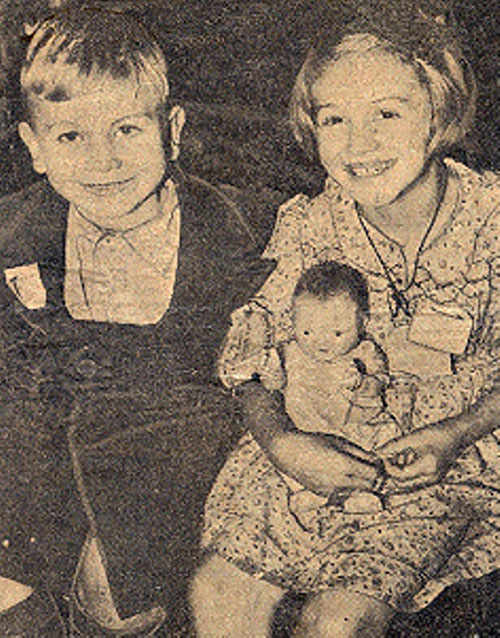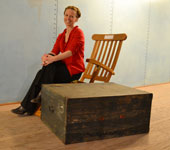In the summer of 1940, as the blitz raged in England, Percy and Grace Blackman’s parents told them they were going to Canada. They were thrilled. They were born in Canada and their family had moved back to their parent’s country in 1938. Percy and Grace were excited until they found out that they were going back alone. They would be evacuee children, waiting out the war in the safety of Canada like thousands of others.
“…there we were, just the two of us, sitting on the train at the London railroad station, nervously waiting for the first stage of our journey to begin,” recalled Grace.

Credit: Canadian Museum of Immigration at Pier 21 [DI2017.222.1]
“My 7-year-old brother, Percy, was sitting next to the window and I was beside him, leaning across to get a last glimpse of my Mother and Granddad Reach as they waved to us from the platform. I waved back with all my energy, but my 8-year-old heart was breaking. I was trying so very hard to be brave but tears just kept tumbling down my face.
“As Mom and Granddad were disappearing from our view, I'm sure that their hearts were breaking, too. Granddad no doubt knew that it would be the last time he would ever see us.”
Percy was seasick during their August 1940 crossing on the SS Hilary but Grace enjoyed the voyage. It was all going pretty well until their arrival in Toronto.
“The most memorable part of my journey occurred when we arrived in Toronto,” Grace wrote.
“We were sent to the residence at the University of Toronto and put through a lot of health tests. One boy on the ship had diphtheria and I was tested and found to be a diphtheria carrier.
“They immediately locked me in a room and when Percy came to see me, they had him locked out. He started crying, kicking and pounding at the door, trying to get in while I was inside, kicking and crying in vain, trying to see my brother.
“Once again we were separated. This was the last contact I was to have with Percy for 14 weeks. He was sent off to Timmins and I was sent off to Riverdale Hospital in Toronto.”
While poor little Grace was in quarantine, her brother Percy was having pretty, epic adventures in Timmons.
“I thought I'd died and gone to heaven,” recalled Percy. “I was like the son Uncle George never had, and I could do no wrong! He became very important to me, too, especially since my own Dad was so far away.
I thought the world of Uncle George. In those days everyone burned slabs in the stoves for cooking and heating, so there were always lots to pile or carry in.
“I remember working, piling slabs in the backyard and then Uncle George taking me to the drug store to buy me a pop. That was something!
“The winter weather was wonderful for the outdoor skating rink. I had my picture taken for the newspaper, when my mother spoke to us from England, over the radio.
“And at one point I did manage to get the strap in school, for kissing a girl in the cloakroom. Maybe it was Shania Twain's grandmother!”
The days dragged on for Grace, but her plucky spirit served her well.
“Brenda, a young teenager, was also detained as a carrier, so there we were, in the hospital and feeling great,” she wrote. “The nurses were absolutely, wonderful to us and did everything they could to make us comfortable, entertained and happy.
“On one occasion they took me to the nurses' residence so I could listen to my Mom on the radio. My brother, who was in Timmins by now, was also listening to Mom as she spoke to us from England.
I remember answering all her questions, ‘Are you being a good girl?’ ‘Oh yes!’ Although I knew she couldn't hear me. It was exciting that Mother could communicate with us this way, especially since I was missing her so much. It was a big deal!
“In those days, little girls wore dresses and I came to Canada with a couple of everyday dresses and one party/Sunday school dress. I remember that when I got to Toronto I thought 'I can wear any dress I want!' because my mother wasn't there to tell me I couldn't, so I started to wear my party dress everyday!
“We had left England in the summer and didn't bring winter clothes with us. As my stay in the hospital stretched on until the beginning of December the Red Cross brought me a green coat, hat, leggings, and winter clothes.
“Whenever we left the hospital grounds we had to wear masks across our nose. We were quarantined from everybody except the prisoners in the Don Jail, who use to shovel the snow - we were allowed to talk with them.
“The nurses took Brenda and me to see the Santa Clause Parade, and we watched it from a room high up in a building, by ourselves. That's the only time I got to the Santa Clause Parade.
“After 13 weeks in the hospital, they took my tonsils out. They said the germs were behind the tonsils, and just after that they told me I could go 'home' (to Timmins).
“By then Brenda had gone and I was feeling quite lonely. In the last letters that I sent from the hospital, I told my parents that I was being really spoiled by the nurses, since Brenda had left. Even a doctor must have been especially attentive to me because I asked my mother if I could marry him the next year - even though he wasn't quite as good as Dad.”
Grace’s Auntie Mary came all the way down from Timmins on the train to get her and they had a wonderful reunion. Grace wrote that in Timmins they were like little celebrities, they were invited to parties and photographed for the papers when they set up a table to sell lemonade and cookies to raise money for the war effort.
Two years later the children’s mother joined them in Timmins and they moved to Paris, Ontario. After the war when their father was discharged he came to Paris where they made their new home.
“In recollecting this time in my life, I realize the profound impact it had on me,” wrote Grace. “It helped to make me strong and independent, and at the same time, bring me even closer to my brother and family. I think it made us all appreciate the times we were able to spend together.”
There is a lot to take away from Grace’s memoir, make a new friend, wear your party dress everyday if it makes you feel better, if you are not sick help others in any small way you can and know that you will come out of this stronger.
And hey, if you develop a crush on a kind doctor all the better, they need our love most of all.
Canadian Museum of Immigration at Pier 21 (S2012.1013.1)
